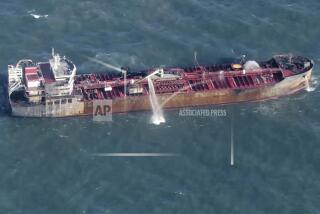New Spill, Same Catastrophic Accounts : Disasters: Episodic news lacking context gives us a false sense of assurance that nothing need be changed.
- Share via
The ship crashed, oil leaked out and journalists flew in. The rental cars got rented, public lodging filled and satellite dishes went up in Shetland Island parking lots. The Braer, the second major European oil spill in five weeks, became news.
We saw images of the wrecked tanker, spilled oil and doomed birds. We learned the Braer was expected to break apart and lose its 25-million-gallon cargo. The accident was blamed on bad weather, mechanical failure and a crew that may have abandoned ship too quickly.
An official of of the Royal Society for the Protection of Birds told the Financial Times that the tanker could not have run aground at a more sensitive spot, but the story did not explain why this spot was sensitive. Tom Brokaw said on NBC that one of history’s worst oil spills was in the making, but did not explain why this spill might be worse than the one in early December. Martha Teichner of CBS said that environmentalists were predicting an ecological catastrophe, but offered no details about the nature of that catastrophe.
It was good storytelling and great drama, but not particularly informative. Why do these spills keep happening? In what sense are they ecological catastrophes? Could this one have been prevented?
The wreck of the Braer, like that of the Greek tanker Aegean Sea on the Spanish coast Dec. 3, was partly attributed to bad weather. But storms at sea are common, and the hurricane-force North Sea winds that blew the Braer aground had been accurately predicted before the ship left port. This kind of weather is routine in the Shetland Island passage, which is used by 1,000 tankers a year. Had the captain been concerned, he could have navigated through calmer seas further north.
Other accounts blamed engine failure, which appears to have been the direct cause. But why did the engine fail? How did water get into the fuel? Why was there no auxiliary drive to maneuver the ship or auxiliary power to lower its anchor?
Whether the crew abandoned too quickly is not as important as whether the ship design anticipated the problem. It did not.
News accounts described the potential ecological catastrophe in terms of wildlife threatened by oil. But dead birds and mammals are not an ecological catastrophe unless whole species are threatened. The real biological threat was that mortality in some parts of a complex aquatic ecosystem, especially to the larval stages of sea creatures, could in future years damage other parts of that system. But even at its worst, the spilled oil was unlikely to cause ecological harm on the scale of ozone depletion or forest destruction.
News accounts suggested that this shipwreck was a discrete accident caused by unusual circumstances. Episodic news, which focuses on discrete events rather than the contexts in which they occur, gives the impression that industrial accidents are isolated and unpredictable, rather than the inevitable result of systems by which goods are manufactured and cargo transported. This perspective gives the public and policy-makers a false sense of assurance that nothing need be changed.
If we looked more closely at the circumstances of dramatic technological failure, we could anticipate and prepare more effectively. We might be able to prevent some spectacular industrial accidents.
More to Read
Sign up for Essential California
The most important California stories and recommendations in your inbox every morning.
You may occasionally receive promotional content from the Los Angeles Times.












